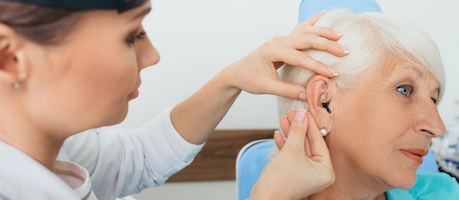Adult Hearing Aids
Studies show that those who delay hearing aid use are at a much greater risk of accelerating conditions like Alzheimer’s, depression and deprived brain function impacting their physical, mental and social well-being. Hearing aid technology continues to improve tremendously by preserving and enhancing the important details of speech, working in tandem to help locate sound, reduce the additional effort put forth to hear particularly in noisy environments and pair seamlessly to Bluetooth enabled devices for wireless streaming capabilities.Learn more about adult hearing aids or how to purchasing adult hearing aids.
Pediatric Hearing Aids
Hearing loss can affect a child’s speech and language, learning, and social development. In cases of permanent hearing loss, hearing aids may be recommended to provide children with better access to sounds. A child can be fit with hearing aids beginning in early infancy and optimal results are usually achieved with full time, consistent use of these devices. Hearing aids come in a variety of color and style options.Learn more about pediatric hearing aids or how to purchase a pediatric hearing aid.







